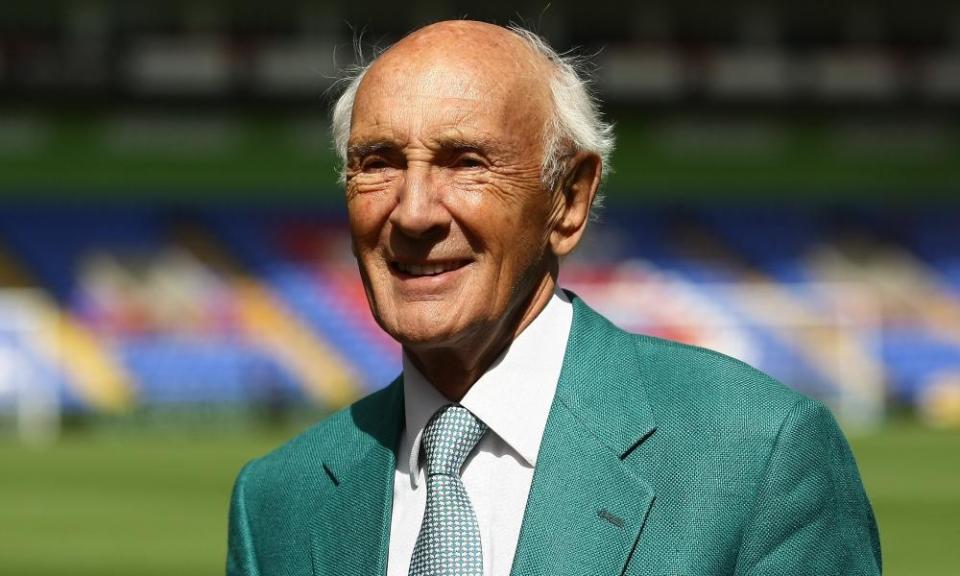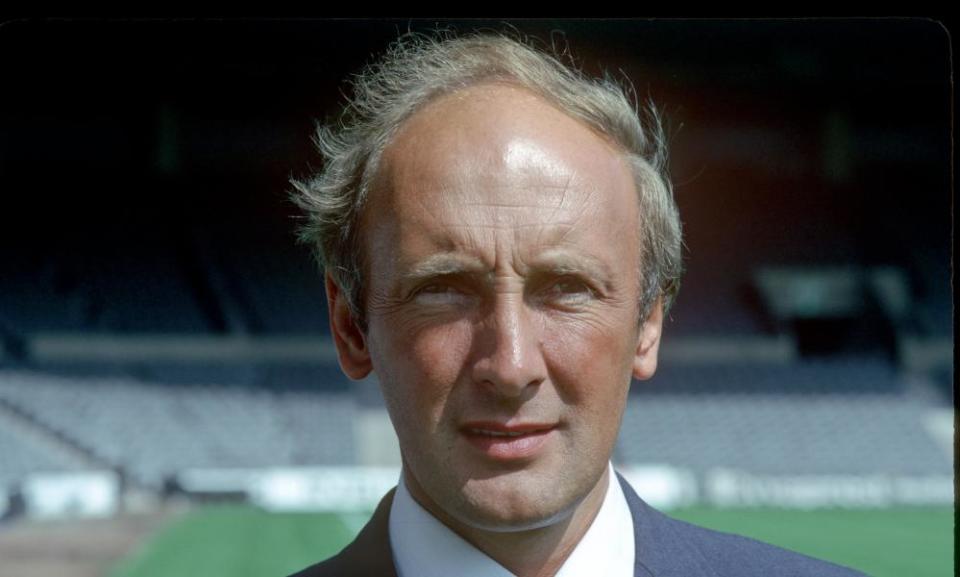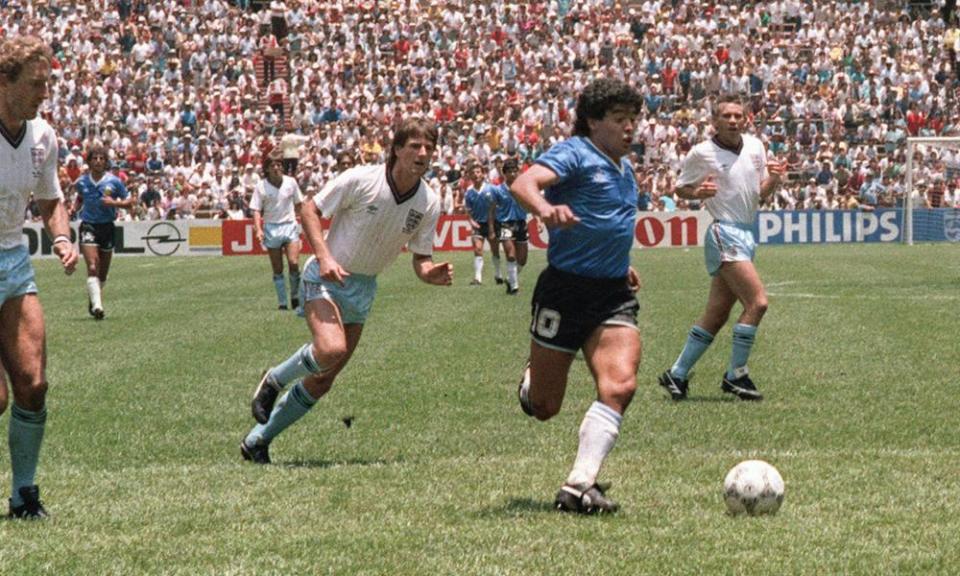Barry Davies: ‘Each generation gets the commentator it deserves’

This is your fourth year of doing The Jump. What’s the appeal? Well, I have to say when they asked me I was totally lost as to why. And I said that to them. They said: “You’ve done a few Olympic Games and we’d like to be able to use your voice.” That was basically the argument. But it’s different. It’s the first time I’ve ever done anything where I’m not able to tell you for certain what’s happened. Or give an opinion.
Have you got to be very careful of avoiding glee or schadenfreude when someone falls? As was famously said of figure skating, “it’s slippery out there.” People can fall and hurt themselves. It’s the same as when you see a bad injury on the football field. I was once caught out by Gary McAllister over what appeared to be only a minor injury, that he seemed to be making an awful lot of fuss about. In fact he was out injured for a month. He pointed that out to me. Quite pleasantly!
Your first football match was a Fairs Cup game between Chelsea and Milan in 1966. How has the world of commentary evolved in those years? I was sitting alongside Jimmy Greaves. I still have the programme, which says: “Here’s to the first of many.” The style of commentary has certainly changed. I’m on record as having said that each generation gets the commentator it deserves. There’s more talk than there used to be. My feeling is that with radio and television, people go from one to the other quite a lot. Having done a little bit of radio commentary, it is very difficult. You’re trying to paint word pictures, whereas on television you’re trying to add to the picture you already have and hope you say the right thing. My foot and my mouth have stayed apart often enough, but there’s always a danger that you’ll open your mouth and put your foot in it.
I imagine an interview doesn’t go by without an question about John Motson? Haha. Who?!
Looking back at your rivalry, do you feel it was overplayed? It was probably overplayed by the media and the BBC. Motty and I were very different people but we got on perfectly well. He did a superb speech for the Jimmy Hill memorial service, it was much the best of the speeches made there. And he read Elton John’s tribute [to Graham Taylor] very well. His life has been football. I’ve had a greater variety. And we had different styles. What we’ve agreed on many times is our longevity. Bless him, he still does it.

Do you keep in touch with him? We might have the odd phone call or go to the same event. We’re not socially friends. But we get on perfectly well. You could argue, and I have – though not too strongly – that that’s easier for him than it is for me, because he was the one who got the matches. I don’t want to rehash old sorrows. I had to accept it. But I didn’t enjoy it and I still don’t understand it.
Do you think there was a turning point when he got the upper hand? I’d done the 1994 World Cup final, which was the first one I had been given. But then the head of sport changed. And then I did two cup finals and that was it – it went back to him. It’s one of those things. The only thing that slightly annoys me is that people think I started doing other sports because I lost out on football. That is not true. My attitude to commentary has definitely been affected by being able to commentate on a boat race, by gymnastics and all the other things I’ve done. Football is a sport that I love greatly, but it gets too much coverage. It’s good when other sports get their say.
What is the single greatest sporting moment you ever witnessed while in the commentary booth? Crikey! That really is an impossible question. I’ve enjoyed doing so many different events. A lot of people don’t enjoy opening ceremonies, but I loved doing the 2012 Olympics. Explaining the opening ceremony to a foreign audience, all those things that our friend [the opening ceremony director Danny Boyle] was trying to achieve – the industrial revolution, the origin of the internet, the National Health Service and so on – was testing! But I enjoyed it very much.
You commentated on Diego Maradona’s second goal against England in 1986. Does that rank up there? The line I said at the time was “that was pure football genius”, and the use of the word “pure”, in comparison with his cheating 10 minutes earlier, was significant to me. That was certainly the best goal I’d ever seen. Whether I would have felt that had I been commentating when [Lionel] Messi did almost exactly the same thing years later, I don’t know.

Was Heysel the hardest event you’ve had to commentate on? I went to commentate on what promised to be one of the greatest European Cup finals of all time, and I found myself describing a tragedy. That was totally out of context with everything else that you do as a commentator. Trying to get the balance right – there were people who were clearly struggling, and it was much like Chinese whispers. It was just impossible.
And the act of commentating on the match after doing that must have been surreal … It was a very surreal experience. One of the guys who I shared a flat with came in and thought: “Oh the football’s still on? What’s the matter with Barry tonight? He sounds half asleep, he’s hardly saying anything.” They didn’t know what had happened.
This season there have been quite a few instances of reporters doing post-match interviews being given short shrift by managers. Is that a problem that you feel is increasing? I think it’s bad manners. They should be above that. This attitude of “who did you play for, how many caps did you win”, which in [José] Mourinho’s case wouldn’t stand up too high. He’s a very good manager, but I feel he’s been unnecessarily grumpy. I’ve done quite a few interviews and nobody’s ever walked out on me. I’ve had a few ups and downs with Cloughie [Brian Clough], who I generally got on with very well. But sometimes you need to say something that forces that person to say something. Do you remember when Ian Wright was trying desperately to break the Arsenal record of the number of goals scored? Every match he was getting increasingly upset about it. So my first question was more or less: “It’s a bloody pain this record, isn’t it?” And he just burst out laughing. And it cut the tension.
Have you any plans to hang up the microphone any time soon? My attitude is that I’m asked if I want to do something and I decide if I want to do it. I do go in with a slight feeling that is this the time where I’m going to make a complete nonsense of it. I was really quite surprised when The Jump came back and asked me to do it again. I’ve enjoyed it, but as time goes on the brain doesn’t work as quickly as it might have done. But I believe I’m still doing Wimbledon. Obviously I don’t get the matches I used to get, which is perfectly understandable, but I love it. With Match of the Day it was a question of leaving the party before you’re invited to go. They had offered me another contract, but I didn’t like the way commentary was going. And I’ve never regretted that, which is not to say there aren’t many matches that I’ve watched and thought: “I wouldn’t mind doing this.”
So if someone called you up and said “we have a spare spot for Russia 2018” would you consider it? Oh yes, I would. It wouldn’t be the country I’d choose to go to, though!
The final of The Jump will be broadcast on Channel Four at 8.30pm GMT on Sunday 12 March

 Yahoo Sport
Yahoo Sport 





































